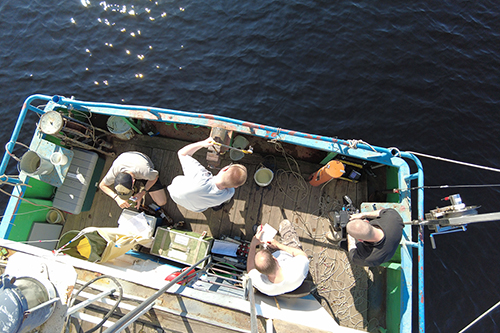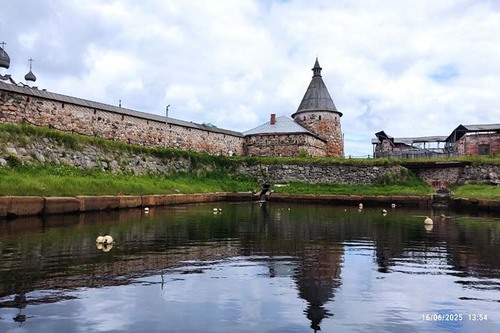During the plenary session of the conference “BRICS Countries: development strategies and cooperation mechanisms in a changing world”, its participants discussed a wide range of questions related to politics, health care, and environment. Leading Russian and foreign experts, representatives of relevant ministries and agencies, business, political parties and non-governmental organizations shared their own visions of the key problems of development, interactions and cooperation of alliance member states and proposed concrete recommendations on handling them.
The spheres and prospects of scientific cooperation within the BRICS Green Agenda were presented by KarRC RAS Director General. In her talk, Olga Bakhmet emphasized the need for broader networking with regional science.
— Scientists at the Karelian Research Center RAS conduct basic research in versatile areas. The significance of our results is confirmed by publications in such reputable scientific journals as Science and Nature. Researchers also pay much attention to applied science, coming up with developments in the spheres of biotechnology, mineral raw materials applications, economics, and tourism. At the same time, our scientists are engaged in popularization of scientific knowledge, telling the public about the results of their work. International projects with BRICS countries are important for us, for example, we continue joint activities with geologists from India, China and South Africa on the study of ancient Archean rocks, with mathematicians from India and China on problems and tasks of mathematical optimization and stochastic modeling, with the Chinese Academy of Sciences in the field of limnology and environmental toxicology. We would like to further expand and deepen these ties. In addition, there is a number of interesting project initiatives that have not yet received funding and are waiting to be implemented. It is therefore important to discuss the issues of financing network cooperation with regions at the upcoming BRICS summit in Kazan in October, — told Olga Bakhmet.
KarRC RAS leader also advertised the second regional conference “Regional cooperation within BRICS: modern environmental and nature management issues”, which will take place in Petrozavodsk on September 18-20. The conference themes include global and regional climate change, monitoring of carbon balance, sustainable nature management solutions from BRICS countries, regional experience in industrial ecology and green economy, nature protection and biodiversity conservation, and many others.
Be reminded that the first regional BRICS conference took place in Petrozavodsk on September 14-16, 2023. Its main topics were the green transition and raising public awareness of the risks and threats of climate change.
News

June 27, 2024
The Second International Conference “BRICS Countries: development strategies and cooperation mechanisms in a changing world” was held in Moscow. KarRC RAS Director General Olga Bakhmet delivered a plenary talk about the main spheres and prospects on scientific cooperation within the BRICS Green Agenda. The Centre’s leader also advertised the regional BRICS Conference to take place in Petrozavodsk in September.
See also:

July 28, 2025
Researchers monitor the state of Lake Onego under climate change and human impact
Staff of the Northern Water Problems Institute KarRC RAS are back from an expedition that covered larger bays and deep-water regions of Lake Onego. The multidisciplinary studies both provide new data on the wellbeing of the lake ecosystem through modern analysis methods and permit tracing the changes relying on over 60-year-long own observation series. Annual monitoring is especially important for evaluating the combined effect of climate change and human impact on the lake.
Staff of the Northern Water Problems Institute KarRC RAS are back from an expedition that covered larger bays and deep-water regions of Lake Onego. The multidisciplinary studies both provide new data on the wellbeing of the lake ecosystem through modern analysis methods and permit tracing the changes relying on over 60-year-long own observation series. Annual monitoring is especially important for evaluating the combined effect of climate change and human impact on the lake.

July 24, 2025
Karelian scientists assess the consequences of human impact on Solovki ecosystem
In 2025, KarRC RAS scientists continued field surveys in Blagopoluchiia Bay, Solovetsky Archipelago, White Sea. Two expeditions have already taken place – in winter and in summer, and one more is coming in August. Scientists explore the human impact on the archipelago’s nature, both in the bay waters and on adjacent land. They have detected an unusual ice structure, collected sediment cores to assess the pollution level, described the composition of the flora in the intertidal zone and the coastal meadows.
In 2025, KarRC RAS scientists continued field surveys in Blagopoluchiia Bay, Solovetsky Archipelago, White Sea. Two expeditions have already taken place – in winter and in summer, and one more is coming in August. Scientists explore the human impact on the archipelago’s nature, both in the bay waters and on adjacent land. They have detected an unusual ice structure, collected sediment cores to assess the pollution level, described the composition of the flora in the intertidal zone and the coastal meadows.



